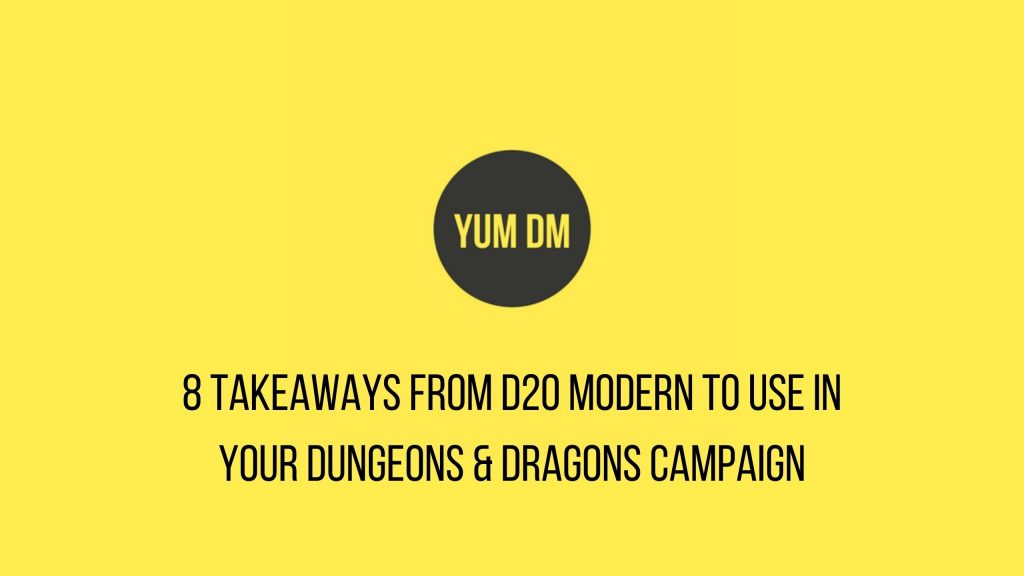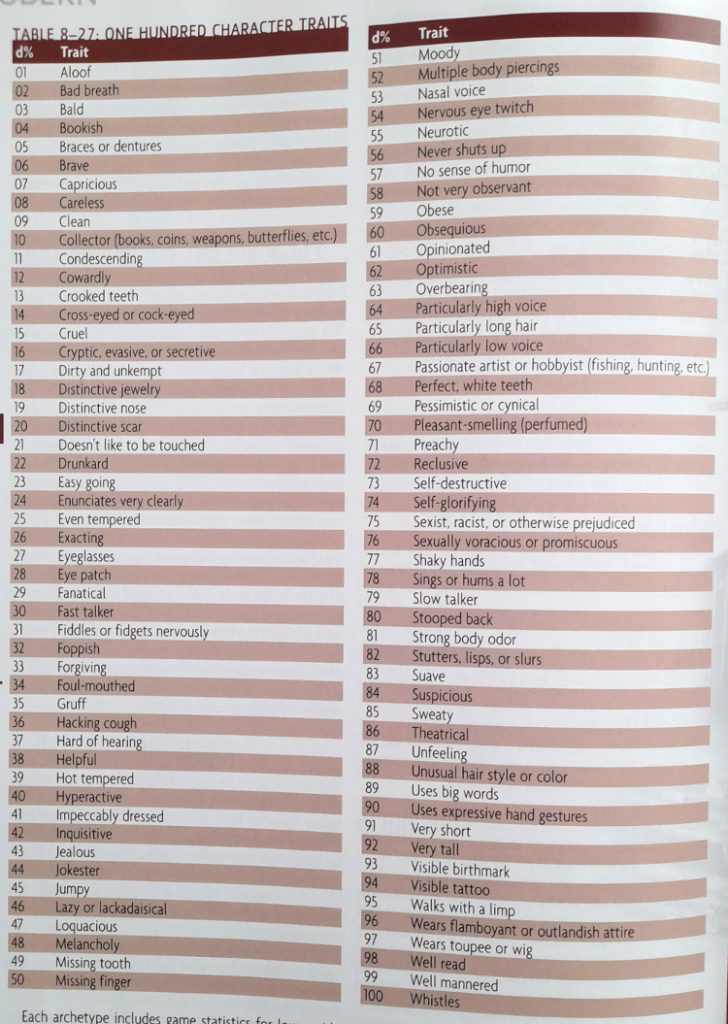
If you are not familiar with D20 Modern, it is a system that came out at the height of the D20 boom in the 2000s, which was powered by D&D 3rd edition.
Cashing in on the D20 craze, Wizard of the Coast released the D20 Modern around the same time as they released the D20 Star Wars RPG.
I never got into D20 Modern at the time, although I did have a copy which I skimmed through, but I managed to grab one off on eBay recently, and found some gems in there.
Here are my 8 take-aways from D20 Modern to use in my Dungeons & Dragons campaign.
D20 Modern Classes
D20 strips away any pretence that D&D has around classes and builds them based on the six abilities (strength, constitution, dexterity, intelligence, wisdom, and charisma).
So, you would have a strength-based character, or Strong Hero. Or a charisma-based character, called a Charismatic Hero.
This is simple and brilliant, and it allows you to choose a profession (basically a background) on top of this.
So you could be a criminal with a dexterity-based character, or what’s called a Fast Hero. Or an academic with an intelligence-based character, or Smart Hero.
In additon to this, each class has a few talent trees specifically for them.
The wisdom-based character, or Dedicated Hero, would have access to an empathic talent tree, healing talent tree, and insightful talent tree. Each tree has 3-4 traits you gain as you level up.
I like this way of looking at classes as you can then apply your profession on top of it. So, you could easily create your strength-based fighter or your dexterity-based fighter easily.
Incorporating this into D&D would be a big shift away from the established classes, but it’s a fun way to build characters and gives you many options.
D20 Modern Allegiances
Allegiances are a replacement for alignment in D20 Modern.
And it’s a good one.
The books describes them as:
The allegiances are indications of what your character values in life, and may encompass people, organisations, or ideals.
You select up to three allegiances from the following list:
- Person or Group
- Organisation
- Nation
- Belief System
- Ethical Philosophy
- Moral Philosophy
For example, you may have an allegiance with a smuggler, the thieves’ guild, and the church of Arinix (deity of luck).
During the game you then act in accordance with these allegiances.
For example, you may side with the thieves’ guild when confronted with whether to turn in a member to the authorities or not.
This may bring you in conflict with NPCs or even your fellow party members.
D20 Modern Action Points
Action Points provide you with the means to affect game play in significant ways.
They basically do one of two things in-game:
-
-
- Alter a single D20 to make an attack, skill, ability, level check or saving throw
-
- Use a class talent feature (if spending a point is required)
When you spend an action point for number 1 above, you roll an additional D6 and add that result to the total.
The number of dice you roll increases as you level up, but you only ever add one of them. So, at 7th level you get to roll 2D6 and take the higher of the two results. At 15th level you roll 3D6 and apply the highest result.
D20 Modern Feats
There are some great feats (think 3rd edition feats, not 5e feats) that are not in the D&D book that probably should be, as listed below. The first list basically adds a +2 to two skills based around the feat concept.
For example, if you took the Attentive feat you would gain +2 to both Investigate and Sense Motive checks.
- Attentive – adds a bonus to investigate and sense motive checks
- Cautious – adds a bonus to demolitions and disable device checks
- Confident – adds a bonus to gamble and intimidate checks
- Creative – adds a bonus to two craft or perform checks
- Deceptive – adds a bonus to bluff and disguise checks
- Educated – adds a bonus to two knowledge checks
- Focused – adds a bonus to balance and concentration checks
- Guide – adds a bonus to navigation and survival checks
- Meticulous – adds a bonus to forgery and search checks
- Nimble – adds a bonus to escape artist and sleight of hand checks
- Studious – adds a bonus to decipher script and research checks
The second list are feats which give some good martial abilities, or makes you rich.
- Brawl (feat tree) – A series of four feats that allow you to fight better unarmed
- Combat Martial Arts – your unarmed damage increases
- Defensive Martial Arts – gain a +1 dodge bonus to AC
- Agile Riposte – allows you to gain an attack against an opponent who attacks you and misses
- Heroic Surge – you may take an extra action (this may be a bit overpowered for most D&D games)
- Windfall – increases your wealth
Wealth Rules
Instead of tracking individual dollars, D20 Modern gives you a single number.
Called your Wealth Bonus, it is added to a D20 roll each time you want to purchase something. And each item has a difficulty number (DN) associated with it.
If your wealth bonus is equal to or greater than the DN of the item, you can automatically purchase it without rolling.
For items above your current wealth level, you will need to meet or succeed the DN on a wealth check to acquire the item.
Your wealth bonus moves up and down as you purchase something or gain more money.
This could easily be ported over to D&D, but you would need to come up with difficulty numbers for each piece of equipment.
Research Skill
You use this skill to learn information from books or similar sources.
This is a great skill to introduce as it will send a signal to, and encourage, players to research people and places before the adventure even begins.
This may give them some insight into what they will be facing, and may even save their lives.
Trait Table
This is a bit of a bonus, but there is a great NPC trait table included in the book which lists 100 traits in a table you can roll randomly for.
Great for those impromptu NPC moments!

D20 Modern Creature Creation
This series of pages guides you through making up a new monster.
This is the stuff that should really be in the D&D DMG!
Once you come up with the basic concept, the book takes you through the process of creating it, giving you the attack bonuses, saving throws, proficiencies, and traits for each creature type (magical beast, undead, etc).
This is an easy and fast way to create some new monsters.
That’s the list, let me know your thoughts in the comments below.
Over to You
Well, what would you incorporate into your D&D campaign?
While You’re Here…
Since 2021 I have been publishing a monthly zine, which has a ton of articles for any edition of Dungeons & Dragons.
They are also available on DriveThruRPG and printed copies are available via my Patreon.
I also have a growing Discord, where you can join in on my regular West Marches campaign.
I will also be releasing some more products in the near future, like several monster manuals and a series of soloRPG publications.
Feel free to reach out to me on Twitter any time.
While You’re Here…
Since 2021 I have been publishing d12 Monthly, a monthly zine, which has a ton of articles for any edition of Dungeons and Dragons.
Printed copies are available in my store. The PDF is available on DriveThruRPG and you can get both, plus support my work, via my Patreon.
I will also be releasing some more products in the near future.
Feel free to reach out to me on Twitter or my contact page any time.

This is the stuff that should really be in the D&D DMG!
100% agree
Yeah, a lot of it should be.